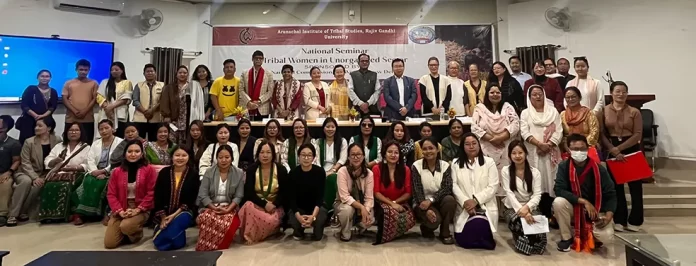RONO HILLS, 2 Dec: A national seminar themed ‘Fluid spaces, crucial contributions: Tribal women in the unorganised sector’, sponsored by the National Commission for Women, New Delhi, was organised by the Arunachal Institute of Tribal Studies (AITS), Rajiv Gandhi University (RGU), here on Monday.
Professor Vandana Upadhyay delivered the keynote address on ‘Women’s employment in India: Emerging issues, challenges and opportunities’’ She underscored “the fundamental variations between organised and unorganised sectors, wherein the contributions of the latter often remains undervalued and unrecognised due to the informal nature of the work, with particular reference to the women labour force participation of the state absorbed in the agricultural sector.”
She also highlighted “the gender gap in work force participation rate in Arunachal Pradesh being 36.5 percent as per the 2021-22 reports.” On a positive outlook, she highlighted “the positive development reflecting a gendered contribution to rural production, a shift to skilled agricultural labour and a reduction in domestic duties, which implies how, despite there being an overall increase in low-paid or subsistence employment, joining the labour force in itself is a positive development.”
Further, she underpinned the creation of “decent, productive employment opportunities, as per SDG 8, with the ongoing prevalence of informal economy, highly criticised for low remuneration and under-representation, along with health- and work-related securities with over-representation of women, which remains a serious issue of NE and overall India.”
She also recommended tailoring policies whilst contextualising the socio-cultural aspects to meet the specific needs of various geographical needs, with particular reference to the marginalised groups and economically disadvantaged areas.
RGU Vice-Chancellor Prof SK Nayak called attention to the dynamic shift in rural perspective. He urged economists and the women labour force to lean on to an output-based mechanism to move out of the ongoing loop of stagnancy.
Registrar Prof NT Rikam praised the women for being the backbone of the state’s community economies while sustaining the critical roles of tribal women in sustaining the household and caregiving burden of the family.
Arunachal Pradesh State Commission for Women (APSCW) Vice Chairperson Nabam Yahi underscored the numerous programmes undertaken by the APSCW, with particular consideration on empowerment of the women labour force in terms of skill development to become self-sufficient and self-employed. Yahi also shed light on how, “despite the harsh burden on womenfolk of the state and bearing higher or equivalent economic hardships, the societal system favours menfolk and patriarchy in differing spheres, ranging from family, household to social allocations of roles and responsibilities.”
She also underscored the need to impart financial education, “especially related to loss and profit in terms of production, particularly designed for the women vendors.” Further, she called for “diving deeper focus on sales production and add value to local produce, horti-agri and tourism and hospitality sector catering to national and international platforms, to make it directly proportional to an increased value and income.”
She urged the government to “increase the allocated amount as the current subsidy of Rs 2-5 lakhs remains insufficient for the entrepreneurs to meet their basic needs.”
The session witnessed a significant turnout, with participants from across the state from diverse walks of life and women working in the ArSLM and other NGOs engaging in thought-provoking discussions.
Papers on a wide range of contemporary issues,showcasing cutting-edge research on women in the unorganised sector, offering new perspectives on key topics, were also presented on the occasion.
RGU AITS Director Prof Jumyir Basar and AITS Assistant Professor, Dr Zilpha A Modi also spoke.




